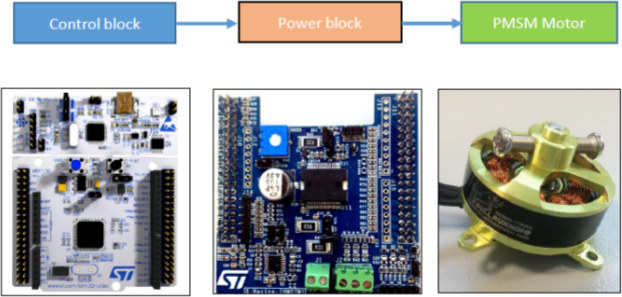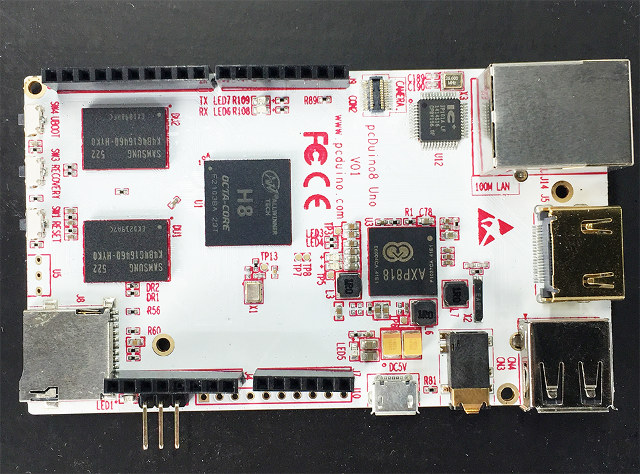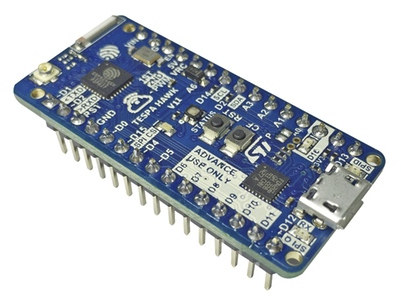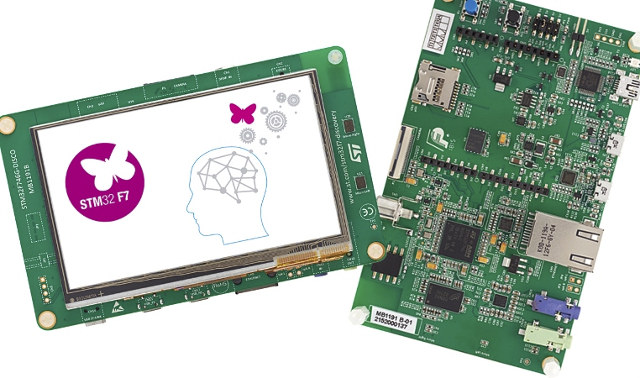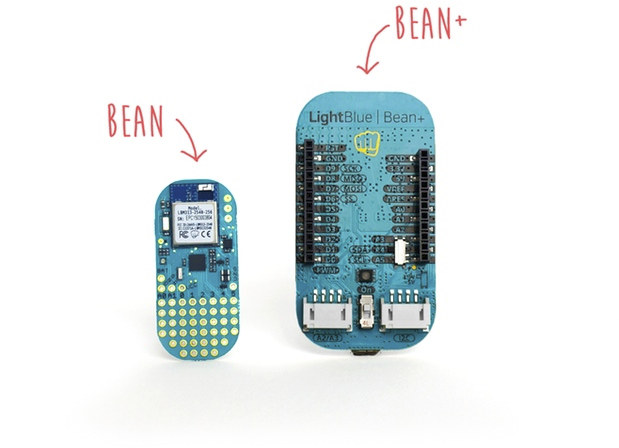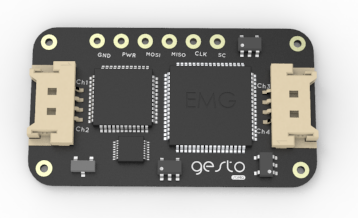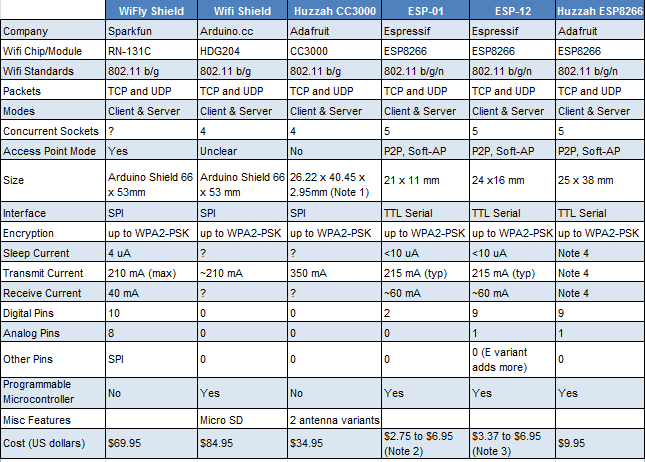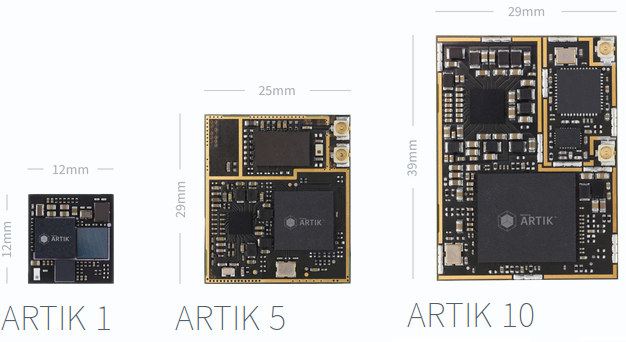STMicroelectronics has recently launched P-NUCLEO-IHM001 motor control starter kit with NUCLEO-F302R8 Cortex M4 MCU board, X-NUCLEO-IHM07M1 driver board for BLDC (Brushless DC) and PMSM (Permanent Magnet Synchronous Motor) electric motors, as well as a Bull Running motor often used in RC helicopters and quadcopters. Technical specifications of the three hardware “blocks” of the kit: X-NUCLEO-IHM07M1 driver board: Three-phase driver board for BLDC/PMSM motors based on L6230 Nominal voltage range from 8 V to 48 V DC 2.8 A output peak current (1.4 A RMS) Non dissipative overcurrent detection and protection Compatible with ST 6-step or ST FOC control algorithm Support for sensorless and sensor mode Hall / encoder motor sensor connector and circuit Configurable jumpers for motor current sensing Potentiometer available for speed regulation ST morpho connectors (found in Nucleo boards) NUCLEO-F302R8 MCU board: STMicro STM32F302R8 Cortex-M4 @ up to 72 MHz with 64KB Flash memory and 16KB SRAM Expansion […]
pcDuino8 Uno is an Allwinner H8 Octa-core Development Board with Arduino Headers
H7 Hummingbird development board powered by Allwinner H8 octa-core Cortex A7 processor with support for 1080p H265 video decoding launched this summer, but Merrii does not usually provide much support to individual developers. Linksprite is about to launch a new H8 development board that also comes with Arduino compatible headers. pcDuino8 Uno board specifications: SoC – AllWinner H8 octa-core ARM Cortex-A7 processor @ up to 2.0GHz with PowerVR SGX544 GPU @ up to 700MHz System Memory – 1GB DDR3 Storage – micro SD card slot up to 32GB Video Output – HDMI 1.4 up to 1080p with HDCP support Audio I/O – HDMI, 3.5mm analog audio jack Connectivity – Ethernet (100M LAN shown on board, but “Gbps” listed in specs) USB – 1x USB 2.0 host port, 2x micro USB ports (1x OTG, 1x power only) Camera – 1x MIPI CSI header Expansion Headers – Arduino Uno headers with 14x […]
TESPA Hawk IoT Board Combines ESP8266 with STM32 MCU in an Arduino Nano Form Factor (Crowdfunding)
TESPA Hawk is an IoT board designed by three companies based in Thailand and Singapore: Deaware delivers the embedded software for the board, Gravitech handles hardware design and manufacturing, and MakerAsia provides the IoT cloud platform. At first glance, it looks like yet another board based on the popular ESP8266 WiSoC, but it also includes an STM32 micro-controller, and its pinout is the same as Arduino Nano. There are also various add-on boards (WINGs) to easily and quickly prototype IoT projects. TESPA Hawk specifications: WiSoC – Espressif ESP8266 @ 80MHz with 8MB Flash MCU – ST Micro STM32F042G6 ARM Cortex-M0 MCU @ 48MHz with 32KByte Flash, 6KB SRAM Connectivity – WiFI 802.11 b/g/n/ with on-board antenna and u.FL socket for external antenna USB – micro USB port for power and programming Expansion – 2x 16-pin headers (mostly) compatible Arduino Nano pinout including 5-channel full range 3.3V ADC (4x 12-bit, 1x 10-bit), […]
STM32F746G-DISCO is a $49 Cortex-M7 Board with a 4.3″ LCD Display, Arduino Headers
We’ve already seen Atmel started shipping its SAM V71 Xplained Board based on its latest Cortex M7 a few days ago, but Atmel is not the company which recently introduced a Cortex M7 development kit, as ST Micro also launched an STM32F7 Cortex M7 development kit with Arduino headers and 4.3″ LCD at the end of June. The “Discovery Kit with STM32F746NG MCU” (STM32F746G-DISCO) comes with the following specifications: MCU – STMicro STM32F746NGH6 Cortex M7 MCU with 1 MB Flash, 340 KB RAM, in BGA216 package Memory – 128-Mbit (16 MB) SDRAM (64 Mbits accessible) Storage – 16 MB Quad-SPI Flash memory, and micro SD slot Display – 4.3″ 480×272 color LCD-TFT with capacitive touch screen Camera – Camera connector Connectivity – Ethernet connector compliant with IEEE-802.3-2002 USB USB OTG HS with Micro-AB connectors, USB OTG FS with Micro-AB connectors USB functions: virtual COM port, mass storage, debug port Audio […]
LightBlue Bean+ Bluetooth LE Board is Programmed Wirelessly, Lasts One Year on a Charge (Crowdfunding)
Punch Through launched a crowdfunding campaign back in 2013 for LightBlue Cortado an innovative Arduino compatible BLE board that can only be programmed wirelessly over Bluetooth Smart. The board has since then been renamed to LightBlue Bean, and the company allegedly delivered rewards to backers on time, a rarity in the crowdfunding world. LightBlue Bean+, the second version of the board, is larger with solderless headers, supports more Bluetooth LE capabilities such as MIDI, and includes a battery. The project launched on Kickstarter yesterday, and already raised over $40,000, surpassing the $30,000 funding target set by the team. LightBlue Bean+ board specifications: MCU – Info N/A (Bean has an Atmel ATmega328P @ 8MHz with 32KB Flash, 1KB EEPROM, 2KB SRAM) Bluetooth Bluetooth LE with support for 5 new capabilities: beacon, MIDI, HID, ANCS and observer role. Hardware module undisclosed (Bean has an LBM313 Module with Texas Instruments CC2540) Up to 400 […]
Gesto is a Wearable Gesture Motion Solution for Makers (Crowdfunding)
A while ago I wrote about an open source prosthetic arm controlled by signals generated by your arm’s muscles. It used an Arduino board, a bio-feedback shield by Olimex, and inMoov Hand for the arm and hand. It worked, but lacked accuracy. Gesto is a solution based on boards powered by Atmel MCUs that looks somewhat similar, but with higher accuracy (over 100 gestures have been tested), and the project has now been launched on Crowdsupply. Two kits are available: Gesto Stella EMG circuit – ADS1294 MCU – Atmel ATmega1284p 2x EMG cables connector Through holes with GND, PWR, MOSI, MISO, CLK and SC Dimensions – 35 x 20 mm Includes 16 disposable electrodes and relevant cables Gesto Caelum EMG circuit – ADS1294 MCU – Atmel ATmega1284p Sensors – 3-axis accelerometer (MMA8652FC) Connectivity – Bluetooth (RN42-HID) 2x EMG cables connector USB – Micro USB connector Programming – ICSP connector Power […]
IoT Wi-Fi Modules Comparison Table – ESP8266 vs CC3000 vs RN131 vs HDG204
We now have several options to add WiFi to IoT / embedded projects at relatively low cost, and ESP8266 based solutions clearly wins on costs, but are there some advantages to other higher priced modules? To help us find out, Mike Barela has put up a comparison table with some Wi-FI modules based on Espressif ESP8266, Texas Instruments CC3000, Microchip RN131, and H&D Wireless HDG204 processors. Note 1 – Also comes in Arduino Shield size with SD card slot for $39.95 Note 2 & 3 – Adafruit and Sparkfun sell tested units with AT Firmware for $6.95. lower prices are available on eBay, but quality may vary. Note 4 – Currents are probably somewhat higher than stock ESP-12 due to onboard LED and regulator. The comparison is not exhaustive, but it still appears to show ESP8266 solutions support most features than pricer competing modules. There are however case where competing […]
Samsung Artik is a Family of Arduino Compatible Boards for IoT Applications
There was a time when development boards were only reserved to companies, then boards like Arduino or Beagleboard made these available and affordable to consumers, and with the introduction of the Raspberry Pi, the maker movement grew even more rapidly, and many low cost boards started to be designed and manufactured mostly my smallest companies. But now larger companies like Intel or Qualcomm have jumped on the makers’ bandwagon, and the latest entry is Samsung with their Artik platform currently comprised of three boards that are programmable with the Arduino IDE. Let’s go through specifications for the three boards: Artik 1 SoC – Dual Core MIPS32 processor @ 250MHz (microAptiv UP) and 80MHz (microAptiv UC) without GPU Memory – 1MB RAM on-chip Storage – 4MB SPI flash Display – Up to WVGA (800×480) Connectivity – Bluetooth Low Energy with chip antenna Security – Secure element Sensor – 9-axis motion sensor […]


